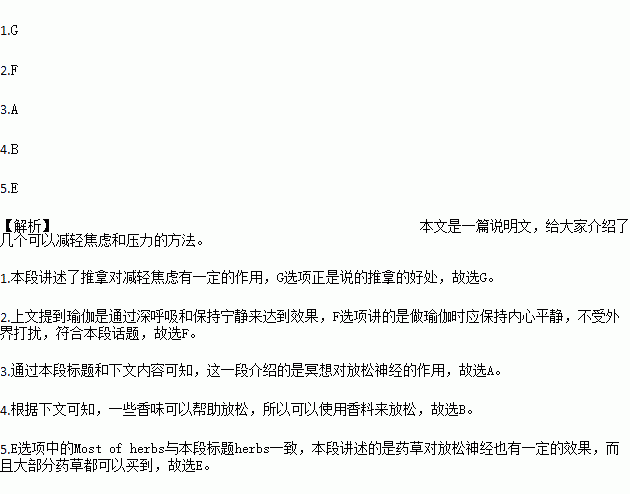题目内容
Anxiety and nervous tension are a part of living in today’s fast-paced, high-stress society. Stress caused by nerves can lead to heart disease, high blood pressure, depression and stroke. While there are numerous chemical substances on the market meant to decrease anxiety that might require a doctor’s prescription, many people choose more natural therapies(疗法) to help calm verves.
Massage
Massage has been found to help relieve anxiety due to the release of tension in the muscles and pain relief. According to the mayoclinic. com, massage may induce the body to release serotonin, which is a natural painkiller and can increase feelings of wellness. 1.Get a massage when you are feeling physically or mentally stressed in order to relax muscles and release tension.
Yoga
Yoga is physical exercise that helps relieve stress by encouraging deep breathing and stillness. 2.It is important to breathe through all of the moves in yoga exercises and keep your body calm and relaxed.
Meditation
3.Meditation helps the mind to relax by bringing the focus away from any problems that might be occurring, focusing the mind on a specific word, picture or breathing. Meditation poses are usually performed while you are seated in a cross-legged position on a comfortable surface, or you can lie down, but must not fall asleep. The mind stays active during meditation, but is calm.
Aromatherapy
4.Certain scents(香味) are said to give you energy and others help induce a state of relaxation. Choose scents that you can connect to a happy time in your life to induce feelings of pleasure. For instance, if you had a rose garden as a child, rose scents might help you to relax.
Herbs
Certain herbs have properties that work to help induce relaxation and calm nerves. Kava is available in both supplement and tea form and works to decrease anxiety. According to experts, you should take no more than 250 mg daily to reduce stress. 5.They are best taken before afternoon or nighttime rest and should not be consumed when you know you will be driving.
A. Use meditation to calm the nerves.
B. Use scents to help calm your nerves.
C. Stress victims are to be found in every walk of life.
D. Don’t ever assume a panic attack is the cause of the problem.
E. Most of herbs can be purchased individually or in relaxation teas.
F. When performing yoga, you should keep your mind still and free of any outside interference to obtain best results.
G. Studies have shown that massage can assist in anxiety reduction, withdrawal symptoms, and stress and anxiety relief.
 阳光课堂同步练习系列答案
阳光课堂同步练习系列答案
